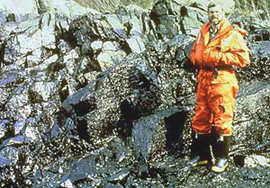
|
Experiment 9 Oil, Water, and Chocolate Mousse
|
Introduction/Background
Oil is a very important product in our modern life. We use oil to fuel our cars, heat our houses, lubricate machinery, aid in making asphalt to pave roads, and make plastics and medicine. The United States alone uses about 700 million gallons of oil every day. The world uses nearly 3 billion gallons every day.
Oil spills in rivers and oceans are usually caused by accidents involving tankers, barges, pipelines, refineries, and storage facilities, usually while the oil is being transported to us. These spills can be the result of people making mistakes, equipment breaking down, natural disasters (such as hurricanes), or even terrorist attacks. |

oil clean-up crew |
Once oil has spilled, any of various local, state, and Federal government agencies as well as volunteer organizations may respond to the incident. Many methods are used to clean up the spill. Booms can be used as floating barriers to oil. Sorbents are big sponges used to absorb oil. Chemical and biological agents can be used to break down the oil. The method chosen depends on the circumstances of the spill.
Key Concepts
Oil floats on salt water (the ocean) and usually floats on fresh water (rivers and lakes). Oil usually spreads out very quickly across the water surface to form a thin layer that is called an oil slick. As the oil spreads, the layer becomes thinner and thinner, finally becoming a very thin layer called a sheen, which often looks like a rainbow. (You may have seen sheens on roads or parking lots after a rain.)

oil on the rocks |
Oil spills can be very harmful to marine birds and mammals, and also can harm fish and shellfish. You may have seen dramatic pictures of oiled birds and sea otters that have been affected by oil spills. Oil destroys the insulating ability of fur-bearing mammals, such as sea otters, and the water-repelling abilities of a bird's feathers, exposing these creatures to the harsh elements. Many birds and animals also swallow oil when they try to clean themselves, which can poison them. Depending on just where and when a spill happens, from just a few up to hundreds or thousands of birds and mammals can be killed or injured. |
Glossary
Boom = a temporary floating barrier used to contain an oil spill.
Sorbent = a substance that sorbs. A material that absorbs another material, generally a liquid.
Related Materials
For more on oil spills:
The Exxon Valdez Oil Spill (http://response.restoration.noaa.gov/spotlight/spotlight.html)
U.S. Environmental Protection Agency (http://www.epa.gov/oilspill/)


